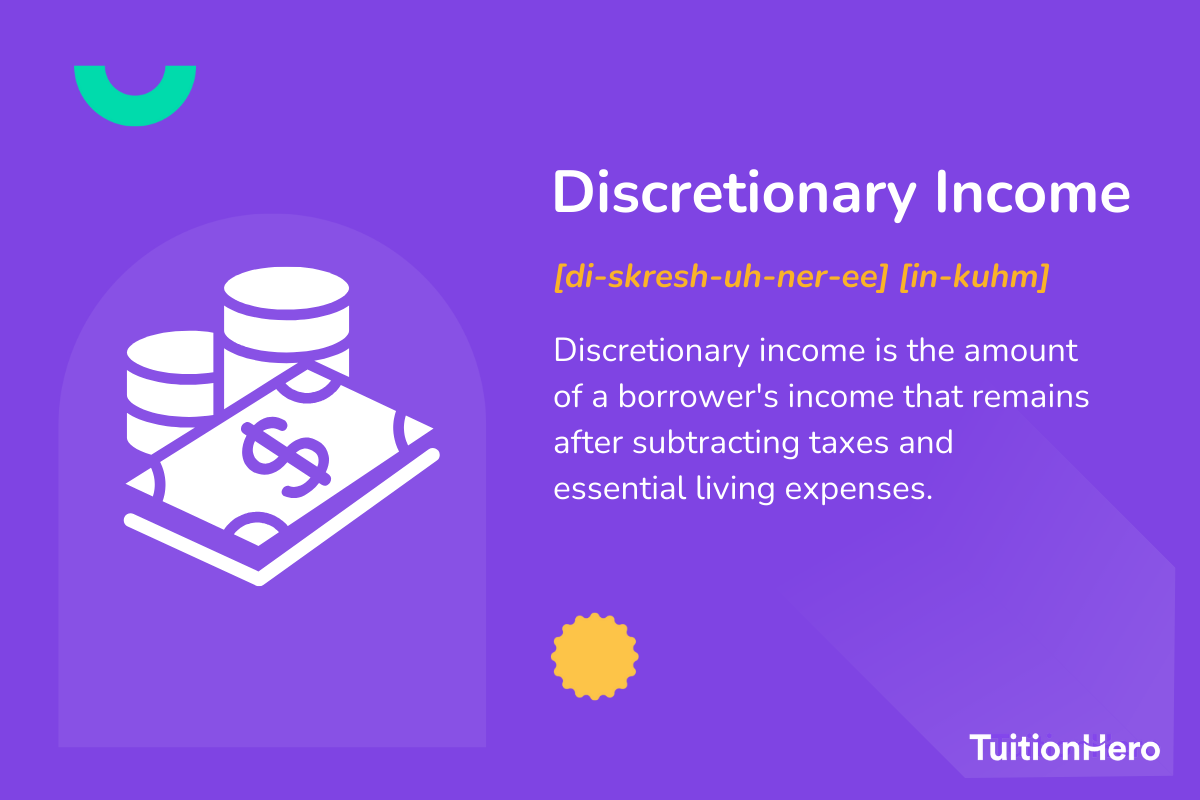Advertiser Disclosure
Last update: November 17, 2024
7 minutes read
What is Discretionary Income?
Master college finance. Navigate discretionary income, IDR plans, and refinancing.

By Brian Flaherty, B.A. Economics
Edited by Rachel Lauren, B.A. in Business and Political Economy
Learn more about our editorial standards



By Brian Flaherty, B.A. Economics
Edited by Rachel Lauren, B.A. in Business and Political Economy
Learn more about our editorial standards
Have you ever wondered, "What is discretionary income?" Simply put, it's the money you have left after paying for your essential needs, like food and housing. For federal student loans, it's a key factor in deciding how much you'll pay each month if you’re on an income-driven repayment plan. Now, let's take a closer look.

Key takeaways
- Discretionary income is the money you have after covering basic needs
- Federal IDR plans use discretionary income to determine monthly payments
- Understanding the pros and cons of IDR plans is crucial in making informed decisions
What does discretionary income mean for student loans?
Discretionary income is the money you have left after covering your essential living expenses like rent, food, and bills. It's the cash you can choose to spend or save as you wish.
For college students, this could be the part of your income not allocated to tuition, required textbooks, or living expenses. Understanding your discretionary income is crucial for making decisions on non-essential expenses like entertainment, dining out, or saving for future goals.
It gives you the freedom to make choices about how to use your money beyond the necessary expenses. Tracking and managing discretionary income is key to maintaining a balanced financial life during your college years.

How do you calculate discretionary income?
Calculating discretionary income sounds like a math headache, but don't worry! The government has a standard way of calculating it to make it simple for everyone, rather than having you calculate all of your personal expenses. Here’s how to think about discretionary income for your loan repayments:
- Under the SAVE Plan: Subtract 225% of the federal poverty guideline from your annual gross income (or AGI).
- Income-Contingent Repayment (ICR): Subtract 100% of the federal poverty guideline from your AGI.
- Income-Based Repayment (IBR) and Pay As You Earn (PAYE): Subtract 150% of the federal poverty guideline from your AGI.
For example, if you're single with a $40,000 AGI, and the federal poverty guideline for 2023 is $14,580, your discretionary income under the SAVE Plan would be $40,000-($14,850*225%); this comes out to $6,588. Under this plan, your annual payment would be 5% of that number for an undergraduate loan, totaling around $30/mo; for grad loans it’s 10% of your discretionary income.

TuitionHero Tip
Remember, federal poverty guidelines can differ based on your family size and state of residence. Consult official government websites to find the latest poverty guidelines applicable to you.
Which Federal IDR Plan suits you?
Not all plans are created equal. Let's explore the options:
- Saving on a Valuable Education (SAVE) Plan: Open to all with eligible federal loans. Payments are tied to your discretionary income.
- Pay As You Earn (PAYE) Plan: Eligibility based on income and family size. Payments are capped to what you'd owe under the Standard Repayment Plan.
- Income-Based Repayment (IBR) Plan: Similar to PAYE, ensuring you won't pay more than the Standard Repayment Plan.
- Income-Contingent Repayment (ICR) Plan: Open to all with eligible federal loans. Payments are linked to your discretionary income.
Remember, you don’t have to navigate your IDR options alone. The official federal student aid website offers a loan simulator where you can see how different plans would affect your monthly payments.
How can your discretionary income affect your student loan payments?
Your discretionary income is important when it comes to figuring out how much you pay each month for federal Income-Driven Repayment (IDR) plans like Income-Based Repayment (IBR), Pay As You Earn (PAYE), and Saving on A Valuable Education (SAVE). These plans calculate your monthly payments based on a percentage of your discretionary income.
Here's the deal: although discretionary income is what you have left after covering essential living expenses from your income, the government uses their own baseline for essential expenses. The formula usually takes 5-15% of that amount to determine your monthly loan payments.
If you have more discretionary income, you pay more each month. If you have less, your payments are lower. The idea is to make paying back loans fit your financial situation.
Keeping an eye on your discretionary income is crucial because any changes in your income can affect your loan payments. Make sure to update your income info with your loan servicer regularly. This way, your payments match what you can afford, making it easier for you to handle your student loans.
How else can you lower your student loan payments?
To make student loan payments more manageable, you can try these strategies:
- Income-Driven Repayment Plans: Sign up for plans like Income-Based Repayment (IBR), Pay As You Earn (PAYE), or Saving on A Valuable Education (SAVE). These plans adjust your payments based on your income, which might lower your monthly payments.
- Extended Repayment Plans: Think about an Extended Repayment Plan. It makes your loan term longer, so you pay less each month. But keep in mind, you might pay more interest overall.
- Consolidation: Combine several federal loans into one with a Direct Consolidation Loan. This can simplify monthly payments, but you might end up paying more interest over time if the rate is higher.
- Public Service Loan Forgiveness (PSLF): If you work in a qualifying public service and make 120 payments under a qualifying plan, you could get loan forgiveness through PSLF.
- Interest rate reduction: Check ways to lower your interest rate, like automatic payments or loan refinancing. Be cautious with refinancing federal loans into private ones, as you might lose federal benefits.
- Financial hardship deferment or forbearance: If you're having money problems, you could qualify for a temporary break or reduction in payments through deferment or forbearance. Remember, interest might still add up.
- Regularly update income information: Keep your loan servicer in the loop about income changes to make sure your IDR plan reflects your financial situation accurately.
Compare private student loans now
TuitionHero simplifies your student loan decision, with multiple top loans side-by-side.
Compare Rates
Dos and mon’ts of Managing discretionary income
Managing the money you have left after paying bills needs some skill. Let's look at what you should and shouldn't do to make sure you're making smart financial choices.
Do
Understand your federal IDR plan eligibility.
Explore refinancing options wisely.
Track changes in income or family size.
Consider the long-term impact of IDR plans.
Don't
Ignore recertification deadlines.
Refinance federal loans without careful thought.
Rely solely on a short-term financial perspective.
Forget the potential tax implications of forgiveness.
Advantages and disadvantages of using an IDR plan
Repaying federal student loans with an IDR plan has its good and not-so-good parts. Let's look at how to make smart choices with your cash.
- Lower monthly payments: plans based on your income give you more room to breathe.
- Flexibility: change your payments when life gets tricky.
- Potential forgiveness: the government might forgive what's left after 20 years of payments under income-driven repayment.
- Extended repayment: plans based on income might make you pay for 25 years.
- Accrued interest: taking longer to pay may mean paying more interest.
- Tax implications: if some of your loans get forgiven, you might have to deal with taxes.

Why trust TuitionHero
At TuitionHero, we help with college finances, including student loans, refinancing, scholarships, FAFSA help, and credit card offers. We aim to match your financial goals and create personalized repayment plans. We turn your education dreams into reality. Trust TuitionHero for complete college finance support.
Frequently asked questions (FAQ)
Deferment puts a pause on your student loan payments because of situations like unemployment or other financial challenges but remember, interest might still add up. On the other hand, IDR plans figure out your payments based on how much you earn. This could mean lower monthly payments, and it helps you keep your loan in good shape.
If you refinance your federal student loans with a private lender, your monthly payments might go down because you get a lower interest rate. But, be careful. There are trade-offs, like losing federal benefits like income-driven repayment plans and loan forgiveness programs.
If you're considering private loans and facing challenges, you can talk to your private loan lender. They might have programs to help during tough times, reduce interest rates, or offer options to refinance. The key is to have a conversation with your lender to figure out what works best for your financial situation.
Final thoughts
In college finance, knowing about discretionary income can make a world of difference in your monthly payments. Your money choices today shape how your education goes.
At TuitionHero, we're here to help you with personalized solutions and expert advice, making your student loan process smooth. Jump into the world of college finance with confidence, knowing how to handle discretionary income and federal IDR plans.
Source
Author

Brian Flaherty
Brian is a graduate of the University of Virginia where he earned a B.A. in Economics. After graduation, Brian spent four years working at a wealth management firm advising high-net-worth investors and institutions. During his time there, he passed the rigorous Series 65 exam and rose to a high-level strategy position.
Editor

Rachel Lauren
Rachel Lauren is the co-founder and COO of Debbie, a tech startup that offers an app to help people pay off their credit card debt for good through rewards and behavioral psychology. She was previously a venture capital investor at BDMI, as well as an equity research analyst at Credit Suisse.
At TuitionHero, we're not just passionate about our work - we take immense pride in it. Our dedicated team of writers diligently follows strict editorial standards, ensuring that every piece of content we publish is accurate, current, and highly valuable. We don't just strive for quality; we aim for excellence.
Related posts
While you're at it, here are some other college finance-related blog posts you might be interested in.
Shop and compare student financing options - 100% free!

Always free, always fast
TuitionHero is 100% free to use. Here, you can instantly view and compare multiple top lenders side-by-side.

Won’t affect credit score
Don’t worry – checking your rates with TuitionHero never impacts your credit score!

Safe and secure
We take your information's security seriously. We apply industry best practices to ensure your data is safe.
Finished scrolling? Start saving & find your private student loan rate today





